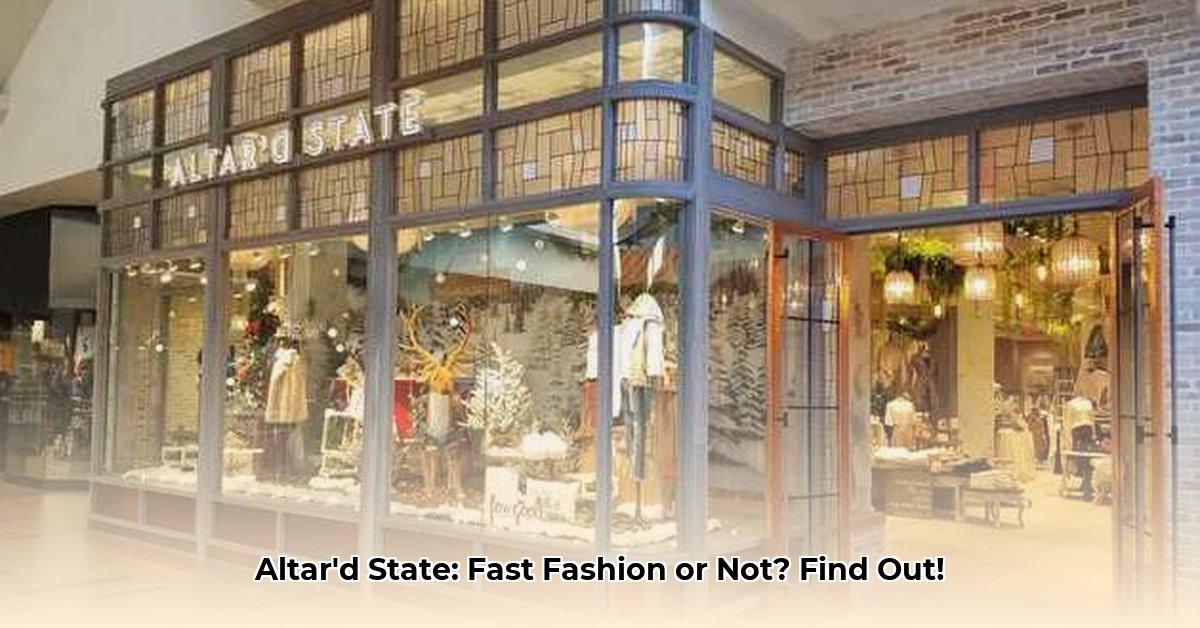
Altar'd State's Ethical Fashion Claims: A Critical Examination
Altar'd State positions itself as an ethical alternative to fast fashion, promoting unique designs and responsible production. However, a critical review reveals a significant lack of transparency hindering a definitive assessment of its ethical credentials. This review analyzes Altar'd State's marketing claims, available evidence, and consumer perspectives to determine whether its actions align with its stated values. The central question remains: Is Altar'd State truly an ethical brand?
Brand Claims and Marketing: The Promise of Ethical Fashion
Altar'd State's marketing materials emphasize unique designs, high-quality materials, and a commitment to ethical production. They present themselves as a conscious choice against fast fashion, highlighting their dedication to responsible practices. However, concrete details supporting these claims are surprisingly scarce.
Evidence Evaluation: Transparency Gaps and Missing Data
The most significant challenge in evaluating Altar'd State's ethical claims is the lack of transparency. Crucial information regarding material sourcing, manufacturing processes, and labor practices remains unavailable. The absence of independent audits or verified sustainability reports makes it impossible to assess the veracity of their marketing messages. A previous website's disappearance further complicates the investigation, raising concerns about potential efforts to conceal information.
Investigating the Unknowns
To address the significant transparency gaps, further investigation is needed. This should include:
- Independent Audits: Commissioning third-party audits of their supply chain to verify labor practices and environmental impact.
- Detailed Sustainability Reports: Publishing comprehensive reports outlining material sourcing, manufacturing processes, and environmental footprint, with independent verification.
- Supply Chain Transparency: Publicly disclosing all suppliers and production facilities, along with the specific labor and environmental standards upheld at each location.
Such actions would significantly enhance the brand's credibility and allow for a comprehensive assessment of its ethical standing.
Consumer Perspective: A Mixed Bag of Experiences
Customer reviews offer a mixed perspective. Positive reviews praise the quality and uniqueness of the clothing, aligning with Altar'd State's marketing of superior craftsmanship. However, negative reviews frequently express concern over the lack of transparency and question the brand's commitment to ethical practices. The inconsistencies in consumer experiences underscore the need for greater transparency and accountability.
Comparative Analysis: Benchmarking Ethical Standards
Comparing Altar'd State’s practices with other ethical fashion brands is crucial for context. Many highly-regarded companies proactively disclose detailed information about their supply chains and sustainability efforts. Altar'd State's lack of transparency contrasts sharply with these industry leaders, raising concerns about its commitment to ethical principles.
Conclusion and Recommendations: A Call for Transparency and Accountability
A definitive assessment of Altar'd State's ethical credentials remains elusive due to a critical lack of transparency. While the brand's marketing suggests a commitment to ethical production, the absence of independently verifiable data prevents a conclusive evaluation. To build trust and earn the "ethical" label, Altar'd State must prioritize open communication, detailed sustainability reporting, and independent audits. This is not merely a suggestion; it is a necessity for operating with integrity within the increasingly demanding ethical fashion sector. Consumers should actively demand transparency from all brands, supporting those who are open and accountable in their practices. Only through collective vigilance and corporate transparency can ethical fashion truly thrive.
Key Takeaways:
- Altar'd State's marketing emphasizes ethical fashion, but verifiable evidence is lacking.
- Transparency is crucial for assessing ethical claims; verifiable data and independent audits are essential.
- Consumer experiences are mixed, highlighting the need for greater openness and accountability from the brand.